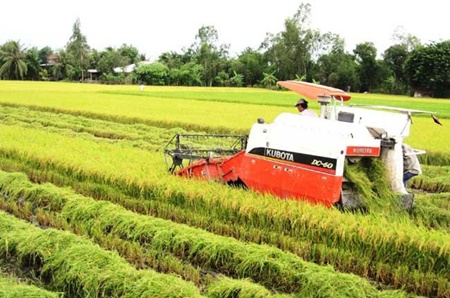|
Investments from
Chinese investors
have been flocking to Vietnam, pouring money into the two main business
fields – textile & garments and real estate.

Troy Griffiths from Savills
A report of the Foreign Investment
Agency showed a “high jump” of the Chinese foreign direct investment (FDI) in
Chinese FDI in
A
Not only eyeing real estate projects,
Chinese investors have also injected big money in textile and garment
factories in
Bloomberg newswire has reported that
the prices of Chinese Texhong Textile shares have increased by 445 percent
over the last 12 months thanks to the investment projects in
In mid-2013, the first stage of the
fiber factory project was kicked off in Quang Ninh province with the
investment capital of $300 million. This is the fourth factory of Texhong in
The Hong Kong based Crystal Group has
recently announced the investment deal of $425 million in Pacific Crystal, a
textile factory, and $120 million in a garment project, covering more than 70
hectares of land in the Lai Vu Industrial Zone in Hai Duong province.
Dr. Alan Phan, an expert about
Chinese market, noted that three years ago, no Chinese thought they needed to
invest in
Big consequences warned
Diep Thanh Kiet, Deputy Chair of the
HCM City Textile, Garment and Embroidery Association, warned that Vietnamese
enterprises would be at a disadvantage amid the Chinese strong investments in
the textile and garment industry.
When cooperating with Vietnamese
outsourcing enterprises, Chinese may “sacrifice” the profit from the
outsourcing to attract laborers from Vietnamese enterprises, while they would
only focus on making profit from material production. As such, domestic
enterprises are likely to lose the battle.
As for the enterprises that buy
materials and sell finished products, Chinese would have more advantages than
Vietnamese because they can buy materials at lower prices thanks to the
existing relations.
While most Vietnamese have to pay
money on material deliveries, Chinese can make deferred payments. This would
help them make products with lower production costs.
Diep has also warned that Vietnamese
enterprises would be more heavily reliant on Chinese materials in the future.
If so, they would do the outsourcing for others for ever. If the Chinese
material factories shut down, domestic companies would lose the material
supply sources.
The high Chinese investment is
believed to lead to the trade deficit increase, because Chinese investors
tend to bring their equipment and machines to
NCDT
|
Thứ Tư, 22 tháng 1, 2014
Đăng ký:
Đăng Nhận xét (Atom)
Không có nhận xét nào:
Đăng nhận xét